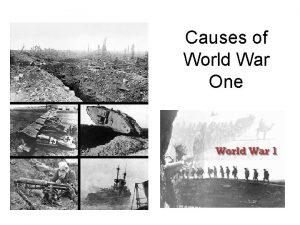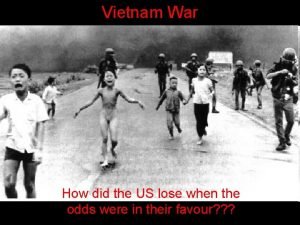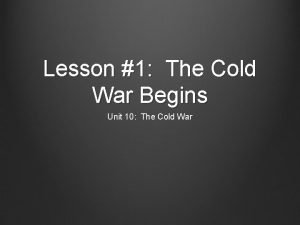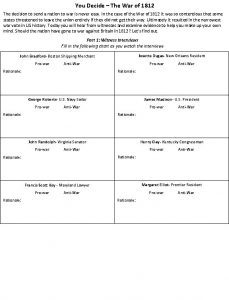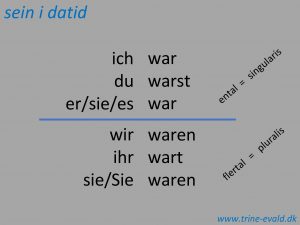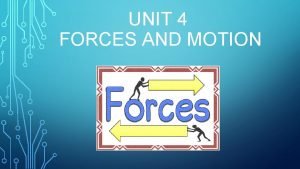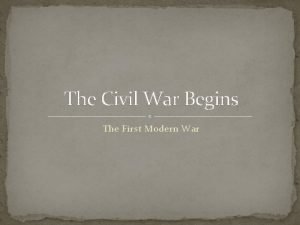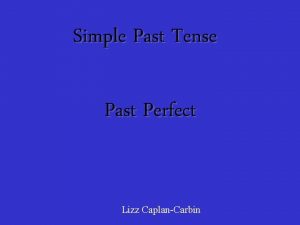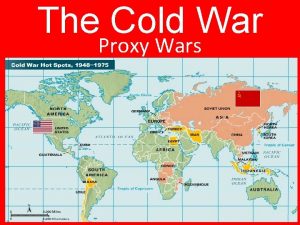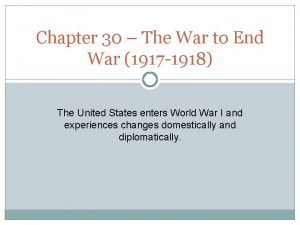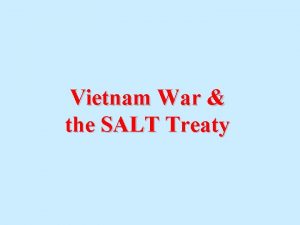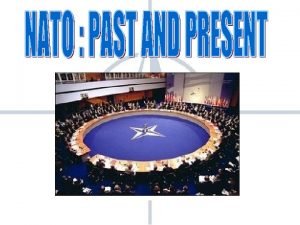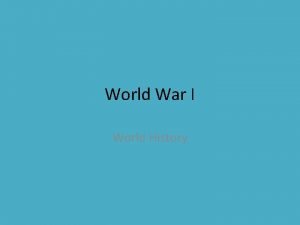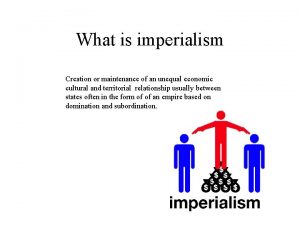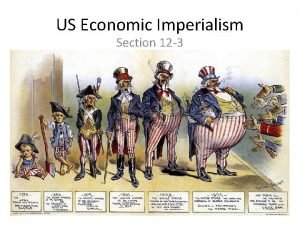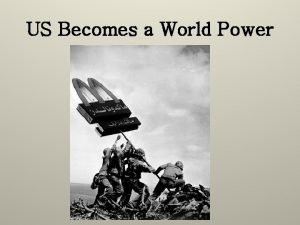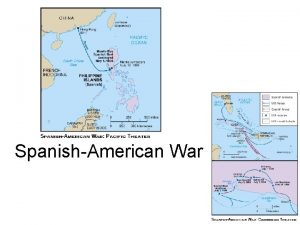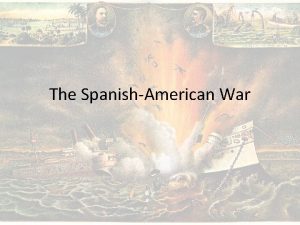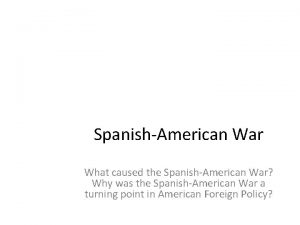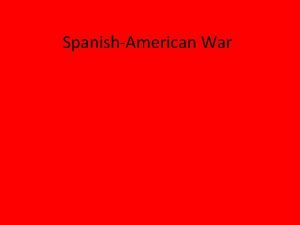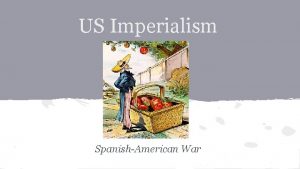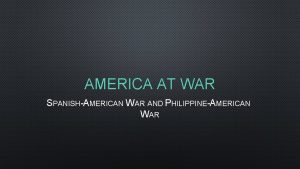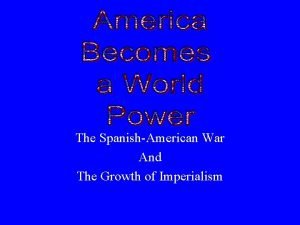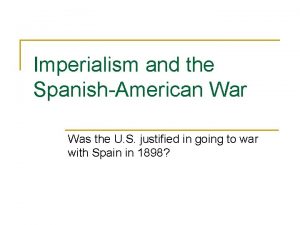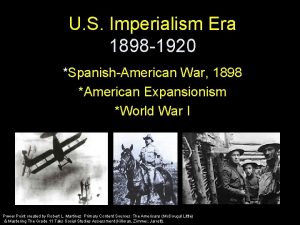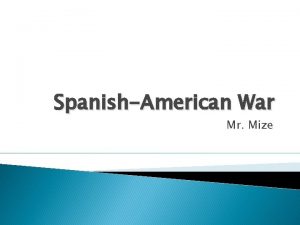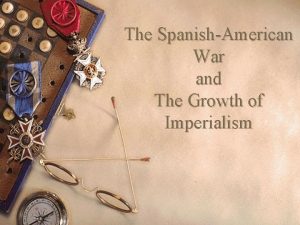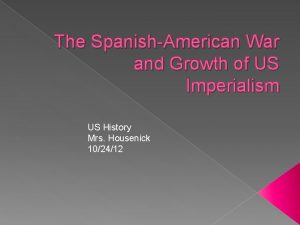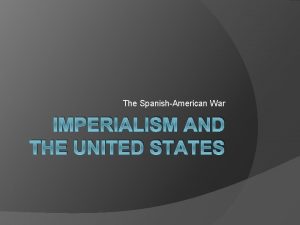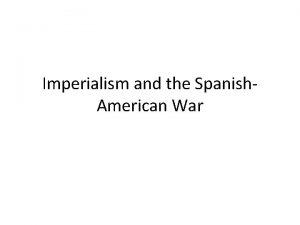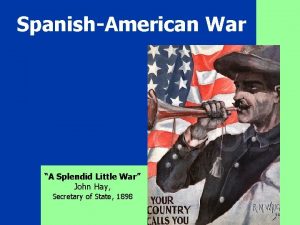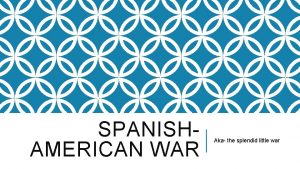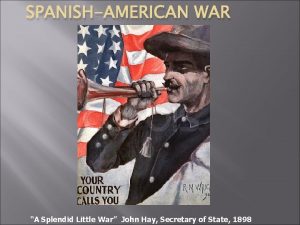SpanishAmerican War What is imperialism Where does imperialism
























- Slides: 24

Spanish-American War

What is imperialism? Where does imperialism exist in the late 1800 s and the early 1900 s? �Stronger nations attempting to create empires by dominating weaker nations. �The late 1800 s marked the peak of European imperialism, with much of Africa and Asia under foreign domination.

Several factors account for the growth of imperialism. �Economic factors: The growth of industry increased the need for natural resources. �Nationalistic factors: Competition among European nations for large empires was the result of a rise in nationalism—or devotion to one’s own nation. �Military factors: Europe had better armies than Africa and Asia, and it needed bases around the world to refuel and supply navy ships. �Humanitarian factors: Europeans believed that they had a duty to spread the blessings of western civilizations to other countries. � By 1890, the United States was eager to join the competition for new territory.

U. S. Imperialism �Following the Civ. War, U. S. focused on domestic issues, not expansion �Purchase of Alaska from Russia (1867) was an exception �Called “Seward’s Folly” $7. 2 million for frozen tundra �By end of century, attitudes changed

U. S. Imperialism �Many thought U. S. needed overseas colonies �U. S. agriculture and industry quickly expanding �Sen. Albert J. Beveridge (IN) stated that U. S. needed new markets, places to invest capital, work for growing labor force �U. S. needed raw materials (rubber, tin) only available overseas �Imperialism – conquering other

�U. S. also wanted to keep up with imperialist European powers �Busy dividing Africa, Asia, Middle East into colonies �Fed by combination of Darwinian “survival of the fittest” and white racial superiority �“White man’s

Naval Power � A chief advocate of U. S. imperialism – Admiral Alfred T. Mahan �Said if U. S. is going to be strong in peace and war, would need a strong navy to protect its interests (The Influence of Sea Power upon History, 1890) � Specifically – would need: �Modern naval fleet �Naval bases in the Caribbean & Pacific �Panama Canal � By 1898 – U. S. had 3 rd largest fleet

� Those in favor of imperialist expansion argued: �Increase U. S. prestige �Increase trade with Far East �Prevent naval and commercial expansion of GR & JP in Pacific �“Uplift and civilize” peoples of Caribbean and Pacific > Mc. Kinley’s main agenda for acquiring the Philippines

Anti-Imperialist League �Many opposed imperial expansion and ratification of Treaty of Paris (Spanish American War) �Anti-Imperialist League formed to oppose expansionist policies �Bi-partisan membership – varying reasons for opposition, including: �Against American ideal of liberty to occupy other countries �Maintaining empire would

U. S. Interest in Cuba �U. S. was particularly interested in Cuba �Cuban Insurrection (186878), Spain beat rebels but agreed to reforms �Promises of reform unfulfilled �U. S. business invested $50 million in Cuba �Built sugar plantations - became main market for Cuban sugar �Cuba prospered until Panic of 1893 & the Wilson-Gorman Tariff (1894) caused widespread economic depression on the

�Cuban War for Independence (1895) �Rebels led by José Martí, engaged in guerilla warfare & destruction of Americanowned property �Hoped that U. S. would intervene & get rid of Spain �U. S. divided over who to support

�Spanish sent General Valeriano Weyler to put down the revolt �Used “reconcentration camps” to contain rural population �Rebels strongest in countryside �Disease & famine killed 200 K in 2 years �Atrocities against rebels by Weyler caused outcry in U. S.

�Newspaper publishers Pulitzer (NY World) & Hearst (NY Journal) fought circulation war using situation in Cuba for sensational headlines �Mixed real and fake stories of atrocities �Yellow Press key in starting war with Spain �Hearst to illustrator Frederic Remington: �“You furnish the

�President Mc. Kinley was resistant to war with Spain �Believed atrocities were committed by rebels & Spanish �Before Mc. Kinley committed to war, Spain softened Cuba policy �Weyler was recalled to Spain �Spain promised more autonomy but rebels demanded independence �Mc. Kinley urged the “war hawks” to give Spain a chance to change � 2 incidents provoked demands for war…

The de Lome Letter �Private letter from a Spanish diplomat – intercepted by Cuban revolutionaries �De Lome called Mc. Kinley weak, indecisive, and only concerned with gaining favor of crowd �Hearst published the text – seen as an insult to U. S. �Unflattering remarks about Mc. Kinley helped fuel country’s aggressive,

�Sinking of the Battleship U. S. S. Maine 2/15/1898 �Mysteriously exploded in Havana harbor, killing 266 crewmen �U. S. Navy & the press blamed Spain

Who would want to sink the U. S. S. Maine? ? ?

�The pressure on Mc. Kinley was too strong – he called for war �War declared on 4/20/1898 �Stated intention was the liberation of Cuba �Teller Amendment – statement by Congress assuring Cubans U. S. did not want to annex Cuba – would guarantee self-rule �Battle cry: “Remember the Maine! To hell with Spain!”

�What were the 4 causes of the Spanish- American War? 1. Reconcentration policy of General Weyler 2. Sensationalism of Hearst and Pulitzer 3. De Lome Letter 4. Sinking of the U. S. S. Maine

�S-A War fought on two fronts – Caribbean & Philippines �Sec. of War Roosevelt ordered U. S. Naval commander in Philippines Commodore George Dewey to attack Spanish fleet if war broke out �His famous quote: “You may fire when ready, Gridley” �U. S. sank Spanish fleet in Manila Bay in 7 hours – May 1, 1898 �U. S. teamed w/ Filipino rebels

�In Cuba, U. S. admiral William Sampson formed naval blockade �Sealed Spanish fleet in Santiago Harbor �U. S. ground troops captured heights around harbor �One group – Rough Riders – led by T. Roosevelt �Most famous battle – Battle of San Juan Hill (7/1/98) �Rough Riders & 2 Black regiments beat the Spanish �Spanish fleet destroyed while

Results � 5000 U. S. deaths (only 345 from battle) �The Spanish surrendered – signed the Treaty of Paris (12/10/98) �Among “prizes” of U. S. victory, U. S. gets Puerto Rico & Guam �Cuba was to become independent

What was the Platt Amendment (1901)? �Authorized American withdrawal of troops only after Cuba agreed to: �not make any treaty with a foreign power limiting its independence �not borrow beyond its means �U. S. reserved right to intervene in Cuba when it saw fit �U. S. maintain a naval base (Guantanamo Bay)

�Despite opposition, the Treaty of Paris (1898) passed by a narrow margin with some Democratic support �The U. S. was on the way to being an empire
 Old imperialism motives
Old imperialism motives Old imperialism technology
Old imperialism technology Causes of ww1
Causes of ww1 What challenges did madison face abroad
What challenges did madison face abroad Vietnam war
Vietnam war The cold war begins lesson 1
The cold war begins lesson 1 Presidential and radical reconstruction venn diagram
Presidential and radical reconstruction venn diagram Why did josette dugas want to go to war
Why did josette dugas want to go to war Ich war du
Ich war du Contact force examples
Contact force examples Civil war first modern war
Civil war first modern war Simple past bringen
Simple past bringen Toward civil war lesson 3 secession and war
Toward civil war lesson 3 secession and war Sides of the cold war
Sides of the cold war Chapter 30 the war to end war
Chapter 30 the war to end war Chapter 30 the war to end war
Chapter 30 the war to end war What does jesus say about war and peace
What does jesus say about war and peace What does salt stand for cold war
What does salt stand for cold war What does nato stand for?
What does nato stand for? What does the man o war eat
What does the man o war eat Alesha dixon he does nothing
Alesha dixon he does nothing What were the causes of imperialism
What were the causes of imperialism Imperialism defintion
Imperialism defintion Economic imperialism definition
Economic imperialism definition Colonialism vs imperialism
Colonialism vs imperialism


